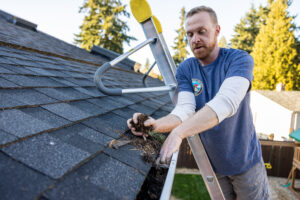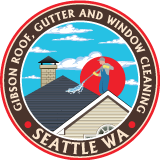Gutters are often overlooked heroes of home protection. These unassuming troughs perched along your roofline play a vital role in directing water away from your home, safeguarding it from a multitude of potential problems. However, when gutters become clogged with debris, they transform from protectors to potential villains, posing serious threats to your property.
The Weight of Neglect: Clogged Gutters and Their Destructive Consequences
One of the most significant dangers of clogged gutters is the sheer weight of accumulated debris. Leaves, twigs, and other organic matter can quickly fill up your gutters, creating a heavy burden. This weight can cause several detrimental effects:
- Sagging and Detachment: Over time, the excessive weight can lead to the gutters themselves sagging or pulling away from the roofline. This not only compromises the aesthetic of your home but also disrupts the intended water flow, directing water inwards instead of outwards.
- Damage to Fascia and Soffit: The fascia board is the board directly behind the gutters, and the soffit is the underside of the roof overhang. When water overflows due to clogged gutters, it can directly impact these areas, causing rot and deterioration. Repairing or replacing these components can be expensive and time-consuming.
- Water Infiltration and Foundation Issues: When gutters overflow, the water cascades down the exterior walls of your home. This creates excessive moisture around the foundation, which can seep through cracks and gaps, leading to basement flooding and potential structural damage. Foundation repairs are notoriously costly and disruptive, making preventative measures crucial.
Beyond the Weight: The Ripple Effects of Clogged Gutters
The problems associated with clogged gutters extend beyond the immediate physical damage they can cause. Here are some additional consequences you may face:
- Mold and Mildew Growth: Stagnant water in clogged gutters creates a breeding ground for mold and mildew. These microscopic organisms can thrive in damp environments and pose health risks to occupants, particularly those with allergies or respiratory sensitivities.
- Pest Infestation: Standing water in gutters attracts insects like mosquitoes and even encourages the development of mosquito larvae. Additionally, the damp environment can attract rodents and other unwanted visitors.
- Roof Damage: Clogged gutters can lead to water pooling on the roof. This can damage shingles, causing leaks and potentially compromising the structural integrity of the roof. Repairing or replacing a damaged roof is a significant expense, highlighting the importance of maintaining proper water drainage.

The Importance of Regular Gutter Cleaning
Given the multitude of potential issues associated with clogged gutters, regular cleaning is paramount. Ideally, gutters should be cleaned twice a year, once in the spring after the winter season’s debris has accumulated and again in the fall before the leaves start falling. If you live in an area with heavy rainfall or significant tree cover, more frequent cleaning may be necessary.
Cleaning your gutters yourself can be a DIY project, but it requires caution due to the potential dangers of working at heights. If you are uncomfortable cleaning your gutters yourself, consider hiring a professional gutter cleaning service. The cost of professional cleaning pales in comparison to the potential expenses associated with repairs caused by clogged gutters.
Additional Tips for Gutter Maintenance
In addition to regular cleaning, here are some additional tips to ensure your gutters function optimally:
- Install Gutter Guards: Consider installing gutter guards to prevent leaves and debris from entering the gutters in the first place. Several types of gutter guards are available, each with its own advantages and disadvantages. Research and choose the ones that best suit your needs and budget.
- Trim Overhanging Branches: Trees with branches overhanging your roof can contribute significantly to clogged gutters. Trimming these branches regularly helps minimize the amount of debris falling into the gutters.
- Inspect Your Gutters Regularly: Regularly inspect your gutters for signs of damage, loose fasteners, or excessive debris buildup. Addressing minor issues promptly can prevent them from escalating into bigger problems.
By understanding the dangers of clogged gutters and implementing proactive measures like regular cleaning and proper maintenance, you can safeguard your home from potential water damage, foundation issues, and a host of other problems. Remember, a little preventative effort can go a long way in ensuring the long-term health and value of your property.
